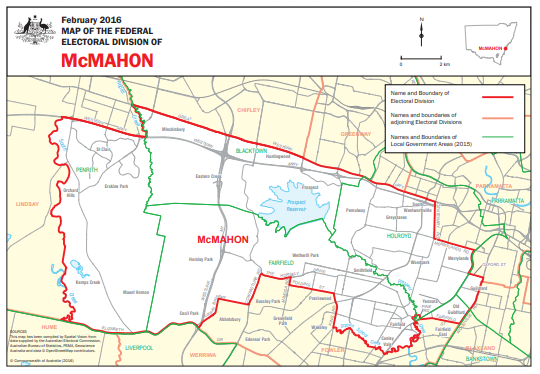|
|
|
|
| Adam Carr's Election Archive
|
Australian federal election, 2022
Division of McMahon, New South Wales
Named for: Rt Hon William McMahon (1908-88), federal MP
1949-82, Prime Minister 1971-72
Western Sydney: Fairfield, Greystanes, Guildford, Smithfield, St Clair
State seats: Parts of
Fairfield,
Granville,
Mulgoa and
Prospect
Local government areas: Parts of
Blacktown,
Cumberland,
Fairfield, and
Penrith
Borders with:
Blaxland,
Chifley,
Fowler,
Greenway,
Lindsay,
Parramatta and
Werriwa
Enrolment at 2019 election: 106,806
Enrolment at 2022 election: 107,312 (+00.5)
1999 republic referendum: No 50.2
2018 same-sex marriage survey: No 64.9
Sitting member: Hon Chris Bowen (Labor):
Elected (for Prospect) 2007, (for McMahon) 2010, 2013, 2016, 2019
2007 Labor majority over Liberal: 13.5% *
2010 Labor majority over Liberal: 7.8%
2013 Labor majority over Liberal: 5.3%
2016 Labor majority over Liberal 12.1%
2019 Labor majority over Liberal 6.6%
* as Prospect
Liberal two-party vote 1983-2019
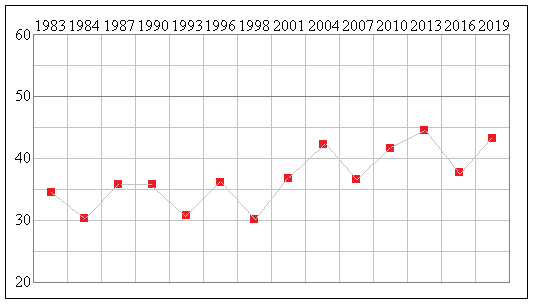
Status: Marginal Labor
Best Labor booths, two-party vote: Fairfield South (73.2), Fairfield Central (72.7), Guildford North (69.0),
Fairfield Heights (68.9), Yennora (68.7)
Best Liberal booths, two-party vote: Kemps Creek (73.4), Horsley Park (70.4), Greystanes East (55.0),
Greystanes North East (52.9), Greystanes (52.1)
2019 results
Statistics and history
Candidates in ballot-paper order:
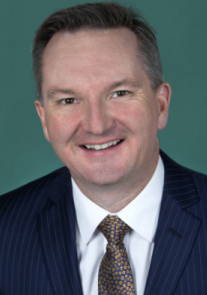 |
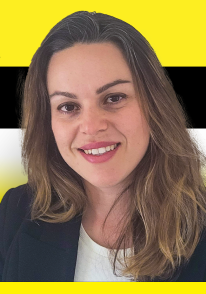 |
 |
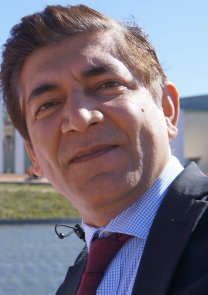 |
1. Hon Chris Bowen
Australian Labor Party |
2. Marie Saliba
United Australia Party |
3. Scott Ford
Pauline Hanson's One Nation |
4. Vivek Singha
Liberal Party |
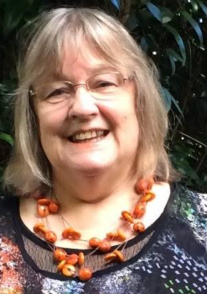 |
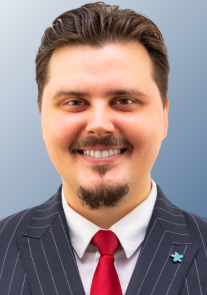 |
5. Astrid O'Neill
Australian Greens |
6. Cameron Shamsabad
Liberal Democrats |
Candidate websites:
Hon Chris Bowen
Astrid O'Neill
Marie Saliba
Cameron Shamsabad
Vivek Singha
Division of McMahon
McMahon was created in 2010, when the old seat of
Prospect was renamed. Prospect had been created in 1969,
occupying a block of what was then new working-class suburbia in western Sydney. Its borders have changed
considerably at successive redistributions, but it has always been centred on the Labor stronghold of
Fairfield. The seat has average level of median family income, but a very low proportion of graduates and of people
in professional and managerial occupations. It also has a high proportion of people non English speaking households,
including 9% born in South-East Asia, and high level of families with dependent children. It also has the highest
proportion of Catholics of any seat in Australia, and conversely one of the lowest proportions of people
professing no religion. This helps explain McMahon's No vote in the 2018 same-sex marriage survey.
Chris Bowen, Labor MP for Prospect from 2004 to 2010 and for McMahon since 2010, was an industrial officer
with the Finance Sector Union and an adviser to NSW state ministers before his election. He was on the
opposition front bench from 2006 and a minister in the Rudd-Gillard Government. He resigned in February 2013
after the first failed Rudd counter-coup against Gillard, but returned with Rudd in June and became
Treasurer. He was Shadow Treasurer from 2013. but resigned after the 2019 election defeat, for which Labor's
tax policies were blamed. He is now Shadow Minister for Climate Change and Energy.
The Labor margin in McMahon has declined in recent years as the western suburbs of Sydney become generally
less reliable for Labor. But having survived the 2013 and 2019 defeats, Bowen is probably secure in this seat. The
Liberal candidate is again Vivek Singha, whose occupation is not stated. The Greens candidate is again Astrid O'Neill,
a TAFE college principal Clive
Palmer's UAP candidate, Marie Saliba, is a Fairfield City Councillor.
Demographics:
Median weekly household income: $1,412 (Australia $1,438)
People over 65: 12.9% (Australia 15.8%)
Australian born: 51.0% (Australia 66.7%)
Ancestry: Lebanese 7.2%, Chinese 5.0%
Non-English-speaking households: 57.3% (Australia 22.2%)
Catholics 36.1% (Australia 22.6%)
Muslim 11.5%
No religion 12.0% (Australia 29.6%)
University graduates: 14.5% (Australia 22.0%)
Professional and managerial employment: 24.8% (Australia 35.2%)
Employed in manufacturing and construction: 29.7% (Australia 22.9%)
Paying a mortgage: 34.3% (Australia 34.5%)
Renting: 32.2% (Australia 30.9%)
Traditional families: 45.8% (Australia 32.8%)
Back to main page
|
|

